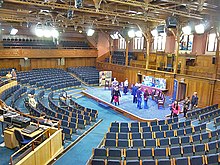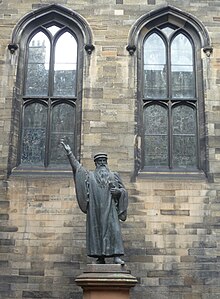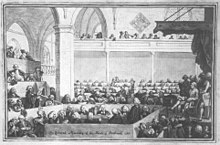Presbyterianpolity is a method of church governance typified by the rule of assemblies of presbyters, or elders. Each local church is governed by a body of elected elders usually called the session or consistory, though other terms, such as church board, may apply. Groups of local churches are governed by a higher assembly of elders known as the presbytery or classis; presbyteries can be grouped into a synod, and presbyteries and synods nationwide often join together in a general assembly. Responsibility for conduct of church services is reserved to an ordained minister or pastor known as a teaching elder, or a minister of the word and sacrament.

The Church of Scotland is the national church in Scotland.

The Church of Scotland was one of the first national churches to accept the ordination of women. In Presbyterianism, ordination is understood to be an ordinance rather than a sacrament; ministers and elders are ordained; until recently deacons were "commissioned" but now they too are ordained to their office in the Church of Scotland.

Alexander Webster was a Scottish writer and minister of the Church of Scotland, who served as Moderator of the General Assembly of the Church of Scotland in 1753. After his service as Moderator he was addressed as Very Rev Dr Alexander Webster.
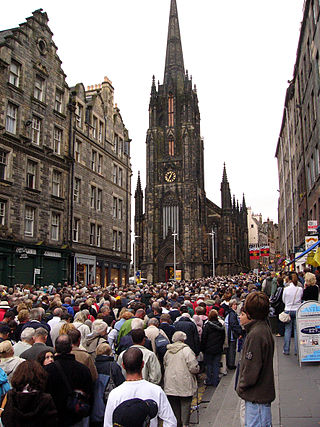
The Hub is a public arts and events building in the centre of Edinburgh, Scotland. Located at the top of the Royal Mile, it is a prominent landmark as its tall gothic spire is the highest point in central Edinburgh, and towers over the surrounding buildings below Edinburgh Castle.
Alison Elliot CBE FRSE is an honorary fellow at New College, Edinburgh. She was the former Associate Director of the Centre for Theology and Public Issues at the University of Edinburgh, Scotland. In 2004 she became the first woman ever to be elected Moderator of the General Assembly of the Church of Scotland. An elder and session clerk at Greyfriars Kirk in Edinburgh, she was also the first non-minister to hold this post since George Buchanan in 1567.

The moderator of the General Assembly is the chairperson of a General Assembly, the highest court of a Presbyterian or Reformed church. Kirk sessions and presbyteries may also style the chairperson as moderator. The Oxford Dictionary states that a Moderator may be a "Presbyterian minister presiding over an ecclesiastical body".
The Church of Scotland maintains a presbyterian polity and is thus governed by a hierarchy of bodies known as church courts. Each of these courts has a moderator and a clerk.
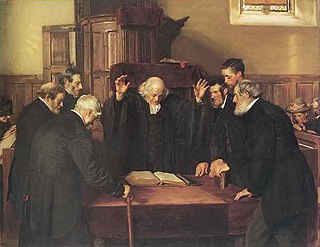
A Church of Scotland congregation is led by its minister and elders. Both of these terms are also used in other Christian denominations: see Minister (Christianity) and Elder (Christianity). This article discusses the specific understanding of their roles and functions in the Scottish Church.

The Lord High Commissioner to the General Assembly of the Church of Scotland is the Scottish monarch's personal representative to the General Assembly of the Church of Scotland, reflecting the Church's role as the national church of Scotland and the monarch's role as protector and member of that Church.

The Assembly Hall is located between Castlehill and Mound Place in Edinburgh, Scotland. It is the meeting place of the General Assembly of the Church of Scotland.
Finlay A. J. Macdonald is a retired minister of the Church of Scotland. He was Principal Clerk to the General Assembly of the Church of Scotland from 1996 until 2010. In addition to his rapid rise up the ranks of the Church of Scotland, Macdonald is known for fostering co-operation between the various boards and committees which administer the Church and for steering the Church smoothly through its annual business meetings.
William Currie Hewitt is a minister of the Church of Scotland and is a former Moderator of the General Assembly of the Church of Scotland (2009–2010).
The Presbytery of Glasgow is one of the 46 Presbyteries of the Church of Scotland. It dates back to the earliest periods of Presbyterian church government in the Church of Scotland in the late 16th century. The Presbytery of Glasgow currently has 125 congregations, making it by far the largest Presbytery in the Church of Scotland.
John Cairns Christie is a minister of the Church of Scotland. He was Moderator of the General Assembly of the Church of Scotland for 2010-2011.
Angus Morrison, is a minister of the Church of Scotland who was Moderator of the General Assembly of the Church of Scotland 2015–2016. He had been nominated for the role a year earlier but withdrew because of ill health. He is an Honorary Chaplain to the Queen, appointed in 2006.
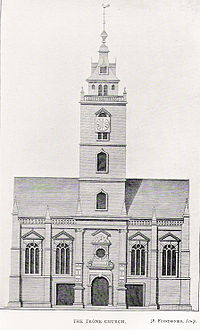
John Drysdale FRSE was twice Moderator of the General Assembly of the Church of Scotland, both in 1773 and in 1784. He was Dean of the Chapel Royal in Scotland 1766 to 1788, and Chaplain in Ordinary to George III. He was brother-in-law to Robert Adam and father-in-law to Andrew Dalzell.

West St Giles' Parish Church was a parish church of the Church of Scotland and a burgh church of Edinburgh, Scotland. Occupying the Haddo's Hole division of St Giles' from 1699, the church was then based in Marchmont between 1883 and its closure in 1972.

The Highland Church was a Gaelic-speaking congregation of the Church of Scotland, based in Tollcross, Edinburgh. Formed by the union of St Oran's Church and St Columba's Gaelic Church in 1948, the congregation continued united with Tolbooth St John's in 1956.

